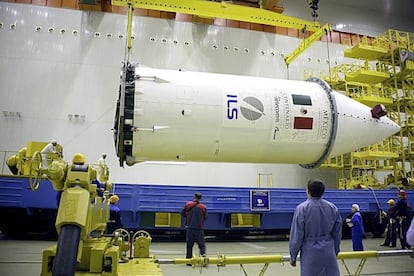$300m Mexican telecoms satellite destroyed after Russian rocket fails
Government claims that losses caused by explosion are fully covered by insurance policies


It took just 490 seconds on Sunday morning for Mexico’s pride in its technological progress to be shattered into a million pieces. Around $390 million worth of hardware went up in flames in the early hours of Sunday, when a Russian Proton-M rocket exploded while carrying the telecommunications satellite Centenario into orbit. The cause of the accident remains unknown.
The Mexican government rushed to announce that the project was fully insured and that the accident will not empty the treasury’s coffers. “There will not be one peso in losses,” said Communications and Transport Secretary Gerardo Ruiz Esparza, who toasted the takeoff with champagne and then followed the launch from the satellite center in Hermosillo. Boeing, the satellite’s maker, says it will take 36 to 38 months to build another one to the tune of $300 million.
Centenario was expected to be active for 15 years, and Mexico was planning to use it to improve telephone, data and video services on mobile devices
The operation to get the satellite into orbit was put into motion in 2012, at a cost of $90 million, when a contract was signed with Russian company International Launch Services (ILS). The Proton-M took off on Sunday at 12.49am from the Baikonur Cosmodrome in Kazakhstan, and the first two phases of the launch passed without incident. But at the start of the third, eight minutes after takeoff, the rocket suffered a series of failures that sent it tumbling back to Earth. The shattered remains of the $300-million satellite are now scattered over the far eastern part of Siberia. Baikonur has suspended all subsequent launches for now.
Centenario was expected to be active for 15 years, and Mexico was planning to use it to improve telephone, data and video services on mobile devices. Another satellite with similar functions, Morelos III, is due to launch in October from Cape Canaveral in Florida under the command of Lockheed Martin.
After the failed launch, Secretary Gerardo Ruiz Esparza tried to limit the embarrassment by explaining that all space flights involve risk. “If we want to have communications technology, we have to face this kind of situation. There is always a danger,” he said. Some experts have asked the government to make all contracts related to the satellite public so that they may analyze them and make sure there are no economic losses to the state. Others, such as Fernando de la Peña, president of the Mexican Space Agency, said in a radio interview that it was a mistake to hire a Russian company known for “an impressive history of failures.”
Tu suscripción se está usando en otro dispositivo
¿Quieres añadir otro usuario a tu suscripción?
Si continúas leyendo en este dispositivo, no se podrá leer en el otro.
FlechaTu suscripción se está usando en otro dispositivo y solo puedes acceder a EL PAÍS desde un dispositivo a la vez.
Si quieres compartir tu cuenta, cambia tu suscripción a la modalidad Premium, así podrás añadir otro usuario. Cada uno accederá con su propia cuenta de email, lo que os permitirá personalizar vuestra experiencia en EL PAÍS.
¿Tienes una suscripción de empresa? Accede aquí para contratar más cuentas.
En el caso de no saber quién está usando tu cuenta, te recomendamos cambiar tu contraseña aquí.
Si decides continuar compartiendo tu cuenta, este mensaje se mostrará en tu dispositivo y en el de la otra persona que está usando tu cuenta de forma indefinida, afectando a tu experiencia de lectura. Puedes consultar aquí los términos y condiciones de la suscripción digital.








































